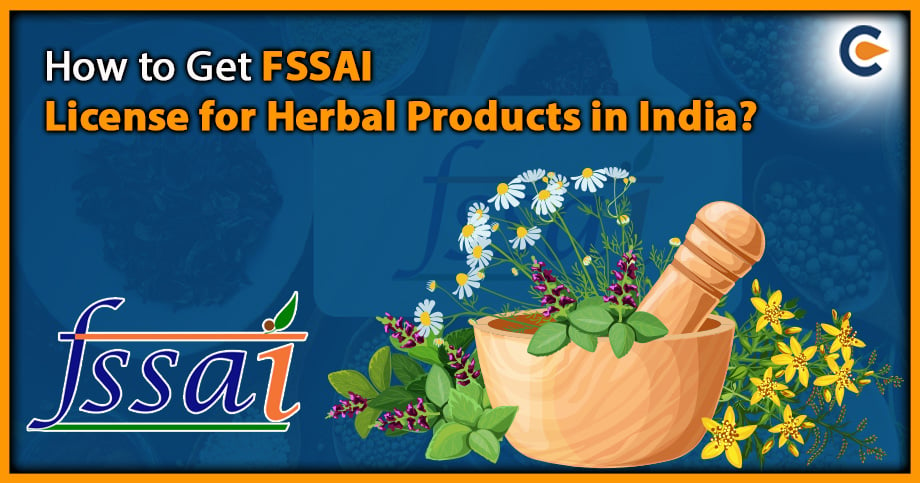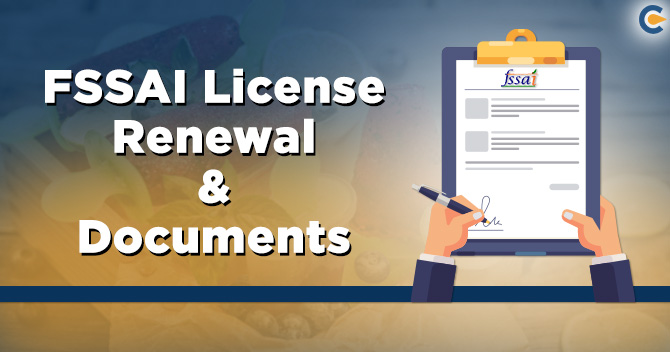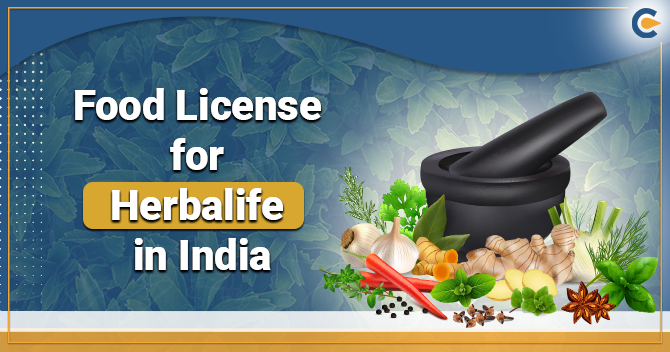Companies that sell herbal products are required to register for an FSSAI license. As a direct consequence of improvements made to India’s healthcare system, an ever-increasing number of Indians are worried about their own health and only want to purchase items that have been given the seal of approval by the Food Safety and Standards Authority of India (FSSAI). Therefore, in order to start a food company in India or manufacture, distribute, sell, or import food goods into the nation, one must first secure the proper permissions. These permits may be found on the respective government websites. An herbal product business is a firm that provides nutritional supplements and personal care products with the goal of promoting weight reduction, gastrointestinal health, cardiovascular health, skin health, and fitness. In this blog, we will discuss FSSAI License for Herbal Products in India.
Herbal Product Manufacturing Company Requires Various License
The following is a list of the numerous types of licenses that are necessary in order to sell Ayurvedic products:
- You will need to get an Ayush production license in order to be able to manufacture and sell herbal goods in the Indian market.
- The phrase “standard quality” refers to the degree to which a medication or cosmetic fulfils the standards set for its sale in the Second Schedule of the Drugs and Cosmetics Act, 1940[1]. These standards were put in place to ensure the safety and efficacy of the products. Due to the nature of their companies, sales of herbal supplements and body care products are regulated by this regulation.
- All businesses who have an annual income that is more than Rs. 20 Lakhs are obliged to register for the Goods and Services Tax (GST). A Goods and Services Tax (GST) identification number, often known as a GSTIN, is a 15-digit code that serves as a unique identity for the purposes of the GST.
- Obtaining an FSSAI License for Herbal Products is necessary since the Food Standards and Safety Authority of India (FSSAI) is in charge of ensuring that food safety rules and regulations are followed across the nation. To comply with the legislation, everyone who wants to make, prepare, package, or distribute food must first get FSSAI Basic Registration. This registration is required for all of these activities.
The Following Is A List Of The Three Different AYUSH Manufacturing Licenses:
- Acquire A Complete License To Produce: This is a legal production license that may be used. You will be in charge of the manufacture as well as the advertising of the goods if this scenario plays out. This suggests that you will need to commence operations at your very own manufacturing facility right once. It is required that each and every criterion that was determined by the AYUSH state authority be met. Different states in India have different requirements that must be met in order to receive a manufacturing license.
The following are the criteria that must be met in order to get an Ayurvedic medicine manufacturing authorization from AYUSH Delhi:- The production facility that you use in your industrial zone has to be at least 1200 square feet in size. There is just 1 class of medicine. If there are going to be more areas added, then there has to be more room.
- In order for the production facility to function properly, GMP certification is required.
- There is a need for two pharmacists and two Ayurvedic doctors at this time.
- It is expected that you will have access to all of the necessary manufacturing and packaging equipment.
- Regular checks of the premises are performed by inspectors looking for drugs.
- Particular Documentation
- You will be able to submit an FSSAI Registration Application after you have completed the processes that came before it.
- Request for Authorization to Loan:
You are not needed to have a manufacturing unit in order to receive a manufacturing license. This is because the license grants you the ability to make products by funding a loan to the manufacturing unit of another manufacturer. A GMP-approved manufacturer is required to issue a Loan license against your organization’s registration in order for it to be valid. After then, it is necessary for you to get regulatory permission for your goods. After then, manufacturing of your goods could start up at the manufacturer’s location. You or the manufacturer can be the one to offer the fundamental materials and packaging that are necessary. You will finally get the finalized product when it has been delivered to you by the manufacturer.
If you want to switch manufacturers, you will need to submit a fresh application for a loan license with a GMP-accredited manufacturer.
The maker of your goods will charge you conversion costs that are equivalent to his manufacturing expenditures. Your company’s name and the fact that it created and sold the product will be clearly displayed everywhere the product is sold, including on the box. There will be no reference made to the creator anywhere inside.
The following is a list of some of the requirements that AYUSH Delhi must meet in order to receive a Loan licensing for Ayurvedic medications:
- We need a facility that has at least three rooms available to us. There will be 1 warehouse for raw materials that are still in the process of being processed, 1 warehouse for finished products, and 1 office.
- A legal Loan License has to be renewed at least once every few years.
- Regular checks of the premises are performed by inspectors looking for drugs.
- It is not necessary to seek the advice of either an Ayurvedic doctor or a chemist.
- It is recommended that you register your company in the same state as the maker of the product.
- If you want to market herbal goods, you won’t be able to apply for an FSSAI license until you first ensure that you satisfy all of the standards.
- Manufacturing And Production Done Under Contract By Other Parties:
In accordance with the provisions of this License, you shall create the product under the auspices of the manufacturing license held by a third-party manufacturer. Because you won’t be creating anything, you won’t need a manufacturing license or a facility to sell your goods because you won’t be doing any manufacturing. The AYUSH office will be the point of contact for the producer in regard to the relevant documentation and requirements.
Considering that you will be dependent on the manufacturer’s production license, it will be the manufacturer’s obligation to seek regulatory clearance for your product. You are responsible for providing the fundamental materials as well as the packaging materials; otherwise, the manufacturer will do it via his own networks. The maker is going to hand over the final product at some point. The name of the firm that is in charge of manufacturing and distribution will be printed somewhere on the packaging of the product.
In addition to the price that he determines for making the items, the manufacturer will also include expenses associated with product certification and conversion. You are going to need to provide evidence of ownership for the item in some form or another. Your company’s name should appear in the aforementioned legal papers as the owner of the goods.
Regardless of the location of the manufacturing company, the marketing company may be situated wherever it is most convenient for them thanks to the flexibility provided by contract manufacturing. Contract manufacturing is a practice that is regularly carried out by large organizations. Several producers provide 5 or 6 unique brands of chyawanprash to a variety of different shops. Marketing and sales are the sole obligations of the brands; the actual manufacturing takes place somewhere else.
Different Types of FSSAI License for Herbal Products
Following are the different types of FSSAI License for Herbal Products:
- Basic FSSAI Registrants are obliged to register with the Food Safety and Standards Authority of India (FSSAI). This includes small-scale food manufacturers, sellers, and distributors with an annual income of up to 12 lakh. On the other hand, the State Government is the one that issues the FSSAI Registration, and its validity might range anywhere from 1 to 5 years.
- The Food and Safety Standards Authority of India (FSSAI) grants the following categories of state licenses: If the annual turnover of a small or medium-sized food firm in a single state (for example, Mumbai) is more than 12 lakh, the owners of that small or medium-sized food company are obliged to apply for the State FSSAI License. This includes producers, storage facilities, retailers, and marketers. The State License is a document that is issued by the State Government and is valid for a period of time ranging from 1 to 5 years.
- If a company does business in more than one state and has annual sales of more than 1 crores, then it is essential to get a Central Food License. This includes importers, exporters, major manufacturers, and terminals, among others. A Central license that has been granted by the Central Government might have a validity term that is anywhere between 1 and 5 years long.
Regulations on Ayurvedic Products Issued by the FSSAI
In order to use the FSSAI emblem and the term “only for dietary use” in compliance with the laws that define the requirements for labelling and permissible modifications, the manufacturers of these items will be needed to become members of the FSSAI.
According to the legislation, the producers of these items are not permitted to make any health claims, including those that relate to the prevention of illness, the diagnosis of disease, or the treatment of disease. To be allowed to make “disease-risk reduction” claims, producers will be required to get “evidence-based prior authorization” from the authorities in charge of food safety. If the authorities are successful in validating FSSAI registration, then the need for prior authorization for health benefit claims will be removed.
Ayurvedic and herbal goods are excluded from the Food Safety and Standards Regulations, 2022, according to the Food Safety and Standards Authority of India (FSSAI).
- Audience Intended to be Targeted:
Because Ayurveda should not be given to babies less than 24 months old, the practice is not mass-produced nor approved for use with young children. It is required that the intended usage, ideal user profile, and advised length of use of all Ayurvedic products be clearly stated on the packaging of such goods.
The Ministry of Ayush will form an expert committee comprised of experienced experts, including members of the FSSAI, to address issues relating to the registration of Ayurvedic and medicinal products, licensure, certification, laboratory accreditation, testing, and quality.
- Herbal Drug Constituents:
Ayurvedic and herbal medications are allowed to use certain kinds of ingredients, according to the laws. In accordance with the regulations, the addition of amino acids, vitamins, or minerals is not permitted to these goods. Nevertheless, producers are obligated to clearly identify any items that include additional vitamins or minerals. Whenever the owner of a licensed food outlet adjusts the purity requirements for ingredients, they are obligated to notify the Food Safety and criteria Administration.
Instructions on How to Complete an Online Application for an FSSAI License for Herbal Products
The following steps must be taken in order to complete the application for an FSSAI License for Herbal Products:
- Examine the FoSCoS webpage through the internet.
- To access the registration form, click the link labelled “register” that can be found in the top-left corner of the page.
- To apply for a new FSSAI license online, first choose the jurisdiction where the license is necessary, and then click the button that says “Apply for a New License/Registration.”
- Choose the business categories that are most applicable to your organization, such as manufacturer, trader, exporter, internet store, etc.
- Pick one of these options depending on the yearly revenue of your organization.
- A yearly amount of less than 12 lakhs.
- 20 crores or more per year
- Spending comes to more than 20 crores rupees every single year.
- Please click this link in order to continue with the registration process.
- Please continue down this page to submit an application for the registration of your firm. Kindly fill out the form with as much information about your firm as possible. On the form, you will be asked to provide the following information:
- Business designation
- Exercise of Economic Activity
- Location of the company’s offices as well as the address for any communication
- You are Receiving Data
- You have the option of choosing an application term that is between 1 and 5 years in length.
- Information pertaining to the consumables that will be created or provided
- Specifics on Mitra’s Food Safety (if They Exist)
- In addition, it would be helpful to have information on when the firm was established, the source of its water, and whether or not it makes use of energy in the manufacturing process.
- To go on with your work, please click Save.
- Depending on the kind of business, you could be asked to give pictures, proof of identification, and other information as part of the application process.
- Simply clicking the appropriate buttons will allow you to either declare anything or make a payment.
- A business deal that includes:
- Credit Cards or Cashier’s Checks
- Online Banking
- UP
- A receipt that may be downloaded right away will be made available through the interface.
Documents Required for FSSAI License for Herbal Products
Following are the vital documents required for FSSAI License for Herbal Products:
- The owner of the company’s latest photograph.
- Original documents such as a PAN card, Aadhaar card, ration card, or voter identification card are required.
- The GSTIN and the PAN card are two examples of important forms of identification for businesses.
- Documentation: Obtaining the Consent of the Landowner (NOC), Obtaining the Consent of the Health Commissioner (NOC), etc.
Application Fees for Online Licenses Issued by the FSSAI
- An application for a Basic FSSAI License would set you back Rs 100 per year.
- Between Rs. 2,000 to Rs. 5000 per year is the cost of obtaining a State FSSAI License.
- To get a Central FSSAI License, you would need to pay an annual cost that is currently set at Rs.7500.
Conclusion
Costs Associated with Failure to Comply with FSSAI is quite considerable. In the event that the FBO operates without first obtaining a Food Safety certificate, the Act specifies that the violator is subject to either imprisonment for up to 5 years or a fine of up to 5 lakh rupees (Rs. 5 lakhs), or both of these penalties.
A firm whose owner or employee sells food that is not up to par may be subject to a fine of up to Rs. 5 lakhs. There is the potential for a punishment of up to Rs. 3 lakhs to be levied in the event that the FBO or someone working on his behalf distributes items under false representations. A punishment of Rs. One lakh may be imposed on any business that illegally or unnaturally enhances the nutritional value of food goods via packaging, sale, storage, distribution, or import. Hence, business owners should be careful before practicing any fraudulent activities.
Read Our Article: How To Get FSSAI License In India: Full Guide











